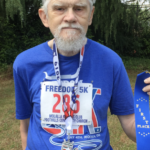 For several decades now, medical researchers have been conducting experiments to determine what interventions, if any, can extend healthy lifespan in humans. Thanks to improvements in the treatment of infectious diseases and other health measures, we are living longer today than our grandparents did, on average. For example, I have already outlived my father, as well as one of my grandfathers. (I’m now working on outliving that other grandfather.) Diseases can be cured and prevented, but the frailty brought on by aging will eventually catch up with everyone, making it increasingly hard to survive. Something will come along that you cannot cope with, and that will be it for you. If the aging process can be slowed down, and robust good health extended, more high quality life can be lived.
For several decades now, medical researchers have been conducting experiments to determine what interventions, if any, can extend healthy lifespan in humans. Thanks to improvements in the treatment of infectious diseases and other health measures, we are living longer today than our grandparents did, on average. For example, I have already outlived my father, as well as one of my grandfathers. (I’m now working on outliving that other grandfather.) Diseases can be cured and prevented, but the frailty brought on by aging will eventually catch up with everyone, making it increasingly hard to survive. Something will come along that you cannot cope with, and that will be it for you. If the aging process can be slowed down, and robust good health extended, more high quality life can be lived.
Interventions that might extend healthy human lifespan have been conducted in experiments on a variety of model organisms, including worms, fruit flies, mice, rats, dogs, and monkeys. Mice make good subjects because their natural lifespan is short, enabling researchers to come to valid conclusions in a reasonable amount of time. Mice are mammals like us and their anatomy is roughly similar to ours.
One intervention that has been tried on mice is calorie restriction. The idea behind the intervention is to see whether mice who get enough food every day to maintain health, but no more than that, live longer than mice who can eat as much as they want. This experiment has been repeated many times by many researchers. Experimental mice were fed a carefully measured adequate diet once a day while control mice had access to ‘infinite’ food that they could eat whenever they wanted. The restricted mice looked and acted younger than the control mice and lived longer.
The experiments made it look like calorie restriction extends lifespan. However, there is another possible explanation. The experimental mice were not only given less food, they were given it less often, once a day, rather than whenever the control mice felt like eating. What if the important thing here is not how many calories are consumed in a day, but rather how long an interval there is between feedings. A long interval between feedings is called a fast. Fasting is a discipline practiced by many spiritual communities. The people in those communities practice fasting as a means to improve their spiritual health, but it may enhance physical health also.
In a recent article appearing in Nature Metabolism, researchers at the University of Wisconsin-Madison describe work that seeks to disentangle the effects of calorie restriction from those of fasting. In previous experiments into calorie restriction, the restricted animals were inadvertently fasted. To distinguish between the effect of calorie restriction and fasting a new experiment was performed on lab mice.
- One group of mice could eat as much as they wanted, as often as they wanted
- A second group of mice could eat as much as they wanted in one meal, but were fasted for the rest of the day
- A third group were calorie-restricted, but fed at intervals throughout the day
- The fourth group were calorie-restricted, and were given only one meal a day
Results were somewhat surprising.
- Fasting without restricting calories improved insulin sensitivity and reprogrammed metabolism
- Fasting with restricting calories reduced frailty and extended lifespan
- Mice who restricted calories, but did not fast, died younger than unrestricted mice
The takeaway here is that we may have been wrong about the life-extending benefits of calorie restriction. Perhaps it is fasting that provides the benefit rather than calorie restriction. It could be that snacking throughout the day, even on low calorie foods, on top of three regularly scheduled meals, is not the best practice for a long and healthy life.
I wonder what the average lifespan of a jungle python is. They might eat one wild pig a month, resting while they slowly digest their meal.
BIO:
Allen G. Taylor is a 40-year veteran of the computer industry and the author of over 40 books, including Develop Microsoft HoloLens Apps Now, Get Fit with Apple Watch, Cruise for Free, SQL For Dummies, 9th Edition, Crystal Reports 2008 For Dummies, Database Development For Dummies, Access Power Programming with VBA, and SQL All-In-One For Dummies, Third Edition. He lectures internationally on astronomy, databases, innovation, and entrepreneurship. He also teaches database development and Crystal Reports through a leading online education provider. For the latest news on Allen’s activities, check out his blog at wwwallengtaylor.com or contact him at allen.taylor@ieee.org